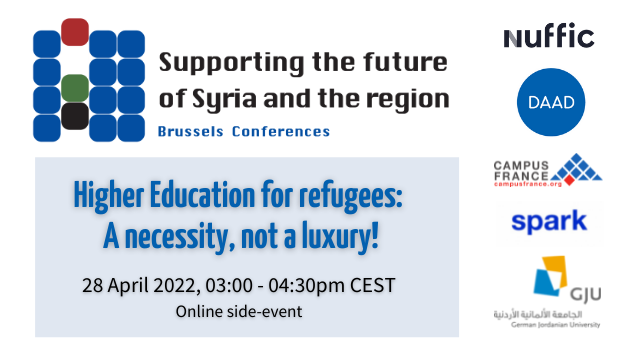
Side-event to the Brussels VI Conference: “Supporting the Future of Syria and the Region”
Higher Education for refugees: A necessity, not a luxury!
On Thursday, April 28, 2022, In the context of the 6th Brussels Conference on supporting the future of Syria and the Region, EDU-SYRIA together with its partners DAAD, Campus France, Nuffic, and SPARK, organized a side event on the importance of higher education during and post-conflict.
During the event, The Minister of Education, Higher Education and Scientific Research of Jordan H.E Minister Wajih Owais explained that currently, 115,000 Syrian students are in the education system of Jordan. 5,800 are enrolled in higher education. The government of Jordan tries very hard to give them the best education. “Education is the only means to build an open mind and reduce fanatic ideology.” But education is not enough. The students should find work too. “It’s a challenge to find employment after graduation”.
The opening of the alumnae inspired Mr. Stefan Delfs, Head of Section Higher Education and Research from the German Federal Foreign Office. “We should present such voices more often.” He believes the investment in higher education is worth the money. “It is a small amount per person”. Mr. Delfs adds that “higher education is not a luxury at all”. Higher education for refugees presents a “perspective out of the misery”. Also: countries in crisis need long-term attention. “Right now a lot of attention goes to Ukraine, but we shouldn’t forget the rest of the world.”
Mr. Axel Weisenberg, The Policy Officer EU and International Cooperation from the French Ministry of Higher Education, Research and Innovation, referred to the ministerial conference in Marseille in March 2022, organized under the French Presidency of the EU, and to its resulting Declaration, according to which the Member States have “underlined the importance of international cooperation in research and innovation and higher education and wish to base this international cooperation on shared values and principles.” He adds: “Higher education should be part of aid to countries in crisis”. But also: “more attention from policy offers for higher education to countries in crisis requires more engagement from all of us”.
Ms. Corinne André, Head of Cooperation in Delegation of the European Union to Jordan, underlined that education is a priority for the EU. “EU is a key partner on education in the response to the Syria crisis.” The joint effort has brought results: “Worldwide an average of 1% of refugees attends universities. 8% of Syrian refugees in Jordan attend universities”. Ms Andre explains that the EU is committed to further supporting higher education for refugees and disadvantaged Jordanians. “We want to sustain the feeling of hope”. For the EU it is important to maximize the impact of its programs based on lessons learned so far. Employability is important. The graduates need to “learn to earn”.
The main outcome of the webinar was certainly to confirm the strategic importance of higher education in emergencies. The great impact reached by the consortium in the neighborhood countries afflicted by the conflict in Syria showed the added value of international partnerships between European organizations and local partners, in light of Team Europe initiatives.
| 15:00-15:10 | Setting the scene – higher education support for refugees from Syria |
| 15:10-15:40 | The voice of the beneficiaries: Syrian youth’s journey |
| Part 1 | Video presentation depicting refugee high school students in Jordan Ms Salwa Moslem – Syrian refugee student who studied in Lebanon Ms Nowar Rahmouni – alumna from EU funded program in Lebanon who started her own business |
| 15:40-16:25 | Panel discussion with key decision-makers |
| Part 2 | Prof Wajih Owais – Minister of Education, Higher Education and Scientific Research of Jordan Mr Axel Leisenberg – Policy Officer EU and International Cooperation from the French Ministry of Higher Education, Research and Innovation Mr Stefan Delfs – Head of Section Higher Education and Research from the German Federal Foreign Office Ms Corinne André – Head of Cooperation in Delegation of the European Union to Jordan |
| 16:25-16:30 | Closing remarks |
Background of the organizers
This collaboration that organizes the side-event (NUFFIC, Campus France, DAAD, GJU, SPARK) works since 2016 in Lebanon, Turkey, Iraq, and Jordan on higher education and vocational education in different EU-funded programs for Syrian refugees. These organizations – often complemented with British Council and International Institute for Education (IIE from the USA) – are regularly advocating at the International Community for more attention to higher education in emergencies/conflict settings / fragile states. Since conflicts tend to become more and more protracted, these organizations believe that the International Community should not limit its interventions in these countries in crisis to acute humanitarian emergencies, but work more and more on higher education too. During the last 6 months and in different configurations these organizations convened public events or meetings with national ministries and/or the EU on the Middle East, Ukraine, and Afghanistan.
These organizations underline that higher education is a necessity and not a luxury. They believe that through higher education, refugees learn to cope with the challenges they encounter and become self-reliant. And they also believe that through education refugees can contribute to the societies and economies of their host countries: education also fosters their participation to the community and promotes inclusion and social cohesion.
